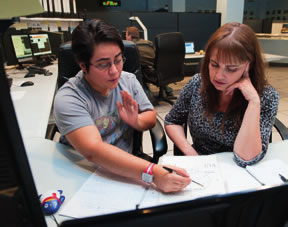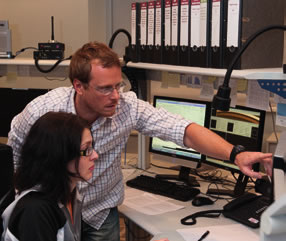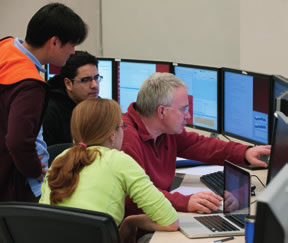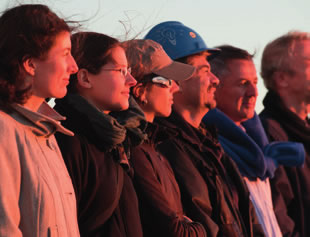Share
Working at ESO
Are you interested in working in areas of frontline technology and in a stimulating international environment? Do you feel your profile matches our requirements? Learn more about our current vacancies and apply online. Read more..








The European Organisation for Astronomical Research in the Southern Hemisphere (ESO) is the foremost intergovernmental astronomy organisation in Europe and the world's most productive ground-based astronomical observatory. ESO carries out an ambitious programme focused on the design, construction and operation of powerful ground-based observing facilities enabling astronomers to make important scientific discoveries.
ESO operates three unique world-class observing sites in northern Chile: La Silla, Paranal and Chajnantor (home to ALMA and APEX), and the ESO Headquarters are located in Garching, near Munich, Germany.
At Paranal, ESO operates the Very Large Telescope, the world's most advanced visible-light astronomical observatory. ESO is a major partner in ALMA, the largest astronomical project in existence. And on Cerro Armazones, ESO is building the 39-metre Extremely Large Telescope (ELT), which will become "the world's biggest eye on the sky" and whose operations will be fully integrated into the Paranal Observatory.
For its Data Management and Operations (DMO) Division within the Directorate of Operations at its Headquarters in Garching, near Munich, Germany, ESO is advertising the position of
Data Scientist (Deep Learning)
Garching
Deadline 25/01/2019
The key goal of the Data Scientist will be to develop and apply innovative Deep Learning techniques to object classification in ESO and ALMA Science Archives (http://archive.eso.org/cms.html and https://almascience.eso.org/alma-data/archive, respectively). With a user base of thousands of scientists, they are a rich and powerful resource for the astronomical community worldwide.
Main Duties and Responsibilities:
The Data Scientist postholder will be responsible for designing, building and training a system based on Deep Learning object classification techniques with the goal to automatically classify astronomical images and spectra to open-up innovative ways for scientists to use the data.
The postholder will research the algorithms most suitable for the content of ESO's Science Archives. They will be expected to contribute innovative ideas to develop the system and critically evaluate and verify the results, including an analysis of limitations. The application of the developed methodologies to data beyond ESO's current concepts may also be explored.
Prototyping in suitable programming and/or scripting languages will be part of the Data Scientist's duties. They will frequently interact with internal and external colleagues to present and discuss results achieved and to plan the next steps ahead.
The position is in the context of the EU project 824064: The European Science Cluster of Astronomy & Particle Physics ESFRI Research Infrastructures (ESCAPE). This project addresses the critical questions of open science and long term reuse of data by joining many of the largest European scientific facilities in physics and astronomy.
Reports to:
Head of the Back-end Operations Department within the Data Management and Operations (DMO) Division
Key Competences and Experience:
Essential competences and experience:
- Proven track record of working with scientific data, especially in data mining, object classification and machine learning.
- Proven track record of applications of Deep Learning techniques to large datasets.
- Ability to prototype software in common programming or scripting languages (e.g. python).
- Strong conceptual and analytical skills.
- Good interpersonal communication skills and ability to work collaboratively in a multidisciplinary and multicultural team, respecting individual differences.
- Right balance between maintaining the big picture and a hands- on attitude to get things done with a proactive can- do attitude.
Desirable competences and experience, which are not mandatory, but considered an asset:
- Experience with astronomical scientific software and data formats.
- Experience with Astronomical Virtual Observatory standards and tools.
- Knowledge of relational databases and SQL.
- Knowledge of Elasticsearch.
- Working experience in astronomy, physics or a related discipline.
Qualifications:
University degree in Computer Science, Mathematics, Astronomy, Physics, Software Engineering, or equivalent.
Language Skills:
Excellent command of the English language.
Remuneration and Contract:
We offer an attractive remuneration package including a competitive salary (tax free), comprehensive health insurance, educational and other social benefits, as well as financial help in relocating your family and the possibility to place your child/children in daycare. For any further information, please visit: https://www.eso.org/public/jobs/conditions/paidassoc/.
The contract is for a fixed term duration of three years non-renewable and subject to individual performance and as defined in the applicable policies and staff rules and regulations. The position is funded by the EU project 824064 - The European Science Cluster of Astronomy & Particle Physics ESFRI Research Infrastructures (ESCAPE), for a period of three years.
Duty Station:
Garching near Munich, Germany with frequent interactions with the ESCAPE partners throughout Europe. Duty trips to the ESO sites in Chile are a possibility.
Career Path: IV
Application:
If you are interested in working in areas of frontline science and technology and in a stimulating international environment, please visit http://www.eso.org for further details.
Applicants are invited to apply online at http://jobs.eso.org/. Applications must be completed in English and should include a motivation letter and CV. Within your CV, please provide the names and contact details of three persons familiar with your work and willing to provide a recommendation letter upon request. Referees will not be contacted without your prior consent.
Deadline for application is 25 January 2019
No nationality is in principle excluded, however, recruitment preference will be given to nationals of Australia, Austria, Belgium, the Czech Republic, Denmark, Finland, France, Germany, Ireland, Italy, the Netherlands, Poland, Portugal, Spain, Sweden, Switzerland and the United Kingdom irrespective of gender, age, disability, sexual orientation, race or religion.
